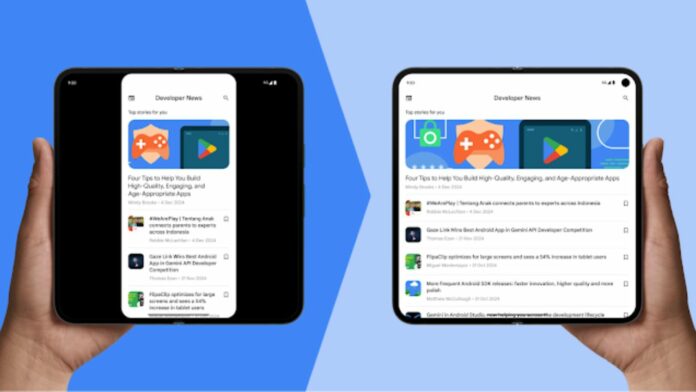After informing last year that the next version of Android would come sooner than the usual timeline, Google has now released the first beta of Android 16. Android 16 Beta 1 comes with a set of new features and improvements, such as the Live Updates feature alongside better app scaling for devices with larger displays like foldables and tablets.
In a blog post, Google said that “users expect apps to work seamlessly on all their devices, regardless of display size and form factor.” To that end, Android 16 is phasing out the ability for apps to restrict screen orientation and resizability on large screens. This is similar to features OEMs have added over the last several years to large screen devices to allow users to run apps at any window size and aspect ratio.
On screens larger than 600dp wide, apps that target API level 36 will have app windows that resize. Developers should check their apps to ensure their existing UIs scale seamlessly, working well across portrait and landscape aspect ratios.
Further, Android 16 Beta 1 enables a new feature called Live Updates. These are a new class of notifications that help users monitor and quickly access important ongoing activities. “The new ProgressStyle notification template provides a consistent user experience for Live Updates, helping you build for these progress-centric user journeys: rideshare, delivery, and navigation. It includes support for custom icons for the start, end, and current progress tracking, segments and points, user journey states, milestones, and more,” the blog post read.
Next, Android 16 advances support for the playback, creation, and editing of high-quality media, a critical use case for social and productivity apps. Android 16 introduces support for the Advanced Professional Video (APV) codec which is designed to be used for professional level high quality video recording and post production. The APV codec standard has the following features:
- Support for HDR10/10+ and user-defined metadata
- Perceptually lossless video quality (close to raw video quality)
- Low complexity and high throughput intra-frame-only coding (without Pixel domain prediction) to better support editing workflows
- Support for high bit-rate range up to a few Gbps for 2K, 4K and 8K Resolution content, enabled by a lightweight entropy coding scheme
- Frame tiling for immersive content and for enabling parallel encoding and decoding
- Support for various chroma sampling formats and bit-depths
- Support for multiple decoding and re-encoding without severe visual quality degradation
- Support multi-view video and auxiliary video like depth, alpha, and preview
It further adds support for “Camera Night mode scene detection”, an API that was confirmed earlier to be coming soon and how Instagram will be utilising it as well. Other notable additions in Android 16 include:
- “Android 16 adds low-level support for rendering and measuring text vertically to provide foundational vertical writing support for library developers. This is particularly useful for languages like Japanese that commonly use vertical writing systems.”
- “Android 16 adds setFieldRequired to AccessibilityNodeInfo so apps can tell an accessibility service that input to a form field is required.”
- “Samsung just launched new Gemini Extensions on the S25 series, demonstrating new ways Android apps can integrate with the power of Gemini. We’re working to make this functionality available to more apps with more OEMs on more devices across more form factors.”
- ”Android 16 includes the new RangingManager, which provides ways to determine the distance and angle on supported hardware between the local device and a remote device. RangingManager supports the usage of a variety of ranging technologies such as BLE channel sounding, BLE RSSI-based ranging, Ultra-Wideband, and WiFi round trip time.”
- “Android 16 brings predictive back support to 3-button navigation for apps that have properly migrated to predictive back. Long-pressing the back button initiates a predictive back animation, giving users a preview of where the back button takes them.”
Android 16 Beta 1: Supported Pixel Devices
Android 16 Beta 1 (BP22.250103.008) system images with the January 2025 security patch are now available to download for the Pixel 6, Pixel 6 Pro, Pixel 6a, Pixel 7, Pixel 7 Pro, Pixel 7a, Pixel Tablet, Pixel Fold, Pixel 8, Pixel 8 Pro, Pixel 8a, Pixel 9, Pixel 9 Pro, Pixel 9 Pro XL, Pixel 9 Pro Fold, and Pixel Pro Fold, as well as the Android Emulator.
Leak suggests that Google will release the stable version of Android 16 on June 3.


